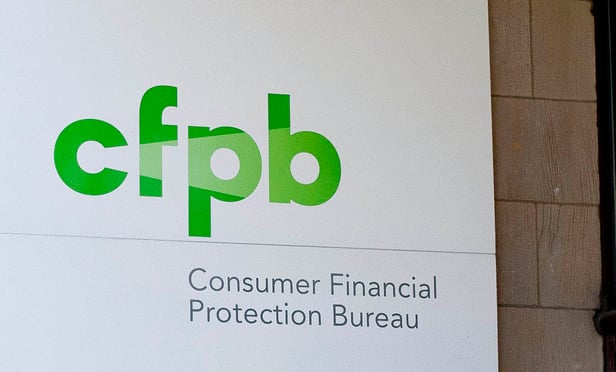 Consumer Financial Protection Bureau building in Washington, D.C. Photo by Diego M. Radzinschi
Consumer Financial Protection Bureau building in Washington, D.C. Photo by Diego M. Radzinschi
In a sign that the CFPB may be preparing to reorganize its credit union advisory council, the agency has posted a charter calling for a much smaller group of credit union employees to be appointed to the group than in the past.
The charter, signed by Acting Director Mick Mulvaney, calls for six members, appointed for one-year terms. Under former Director Richard Cordray, the council had a minimum of 15 people and a maximum of 20. Members could serve two-year terms, under the Cordray charter.
Recommended For You
Mulvaney disbanded the credit union group and fired its members in June. At the same time, he disbanded community bank and consumer advisory panels. Members of those panels had been appointed by Cordray.
When the credit union group was disbanded, it had 17 members.
At the time the boards were disbanded, agency officials released a statement saying that, "by both right-sizing its advisory councils and ramping up outreach to external groups, the Bureau will enhance its ability to hear from consumer, civil rights, and industry groups on a more regular basis."
A CFPB spokesman said earlier this month that new members of credit union group will be appointed late this summer.
The new charters for the credit union, community bank and citizens advisory groups are dated in June, but just recently were publicly released.
In addition to the smaller membership, the advisory council may meet less frequently. The new charter states that the group will meet "from time to time" but will meet at least once a year.
The old charter estimated that the advisory group would meet four times a year, with at least two meetings taking place in Washington.
While the new charters may be a sign of increased activity at the agency, it is unlikely that the agency will have a permanent director anytime soon.
An aide to Sen. Elizabeth Warren (D-Mass.) said Tuesday that the senator intends to use every procedural tool at her disposal to block the confirmation of Kathy Kraninger as permanent director of the agency. While Warren alone does not have the power to kill the nomination, she can push for an extended floor debate.
As a result, it is unlikely that Kraninger will be confirmed before the November mid-term election, said Alan Kaplinsky, co-practice leader for the Consumer Financial Services Group at Ballard Spahr. That would leave confirmation for a lame-duck session following the election.
But Kraninger's nomination could languish even after that and if she is not confirmed by the end of the year, her nomination expires. President Trump would have to re-nominate her or another person next year.
And so, Mulvaney is likely to be working with the reconstituted advisory groups for some time.
The consumer group is required under Dodd-Frank; the other two boards are suggested, but not required under the law.
When he disbanded the consumer group, Mulvaney was vehemently criticized by consumer groups and Democratic members of Congress. Members of the consumer group had been appointed by Cordray. Several of its members were representatives of consumer advocacy organizations and they bitterly disagreed with many of Mulvaney's initial decisions.
Under Cordray, the consumer group's charter called for at least 16 members, with six members appointed based on recommendations made by presidents of the Federal Reserve Banks.
The Federal Reserve Bank-appointed members are required under Dodd-Frank.
Under the new charter, issued by Mulvaney, those six members will be the only members of the consumer group.
The community bank group also will include six members.
© Touchpoint Markets, All Rights Reserved. Request academic re-use from www.copyright.com. All other uses, submit a request to [email protected]. For more inforrmation visit Asset & Logo Licensing.






